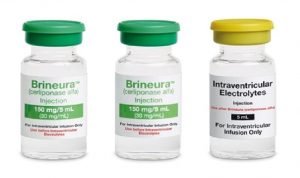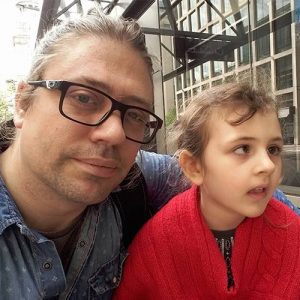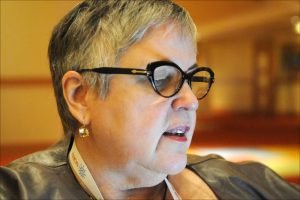Recommendation Against U.K. Coverage of Brineura Jolts Batten Disease Community

A preliminary recommendation against British National Health Service insurance coverage of the $702,000-a-year therapy Brineura (cerliponase alfa) to treat a specific type of Batten disease is “cruel and inaccurately based,” the U.K. nonprofit Batten Disease Family Association contends.
The expensive drug, manufactured by San Francisco-based BioMarin, is aimed at treating a tiny subset of patients with a form of Batten disease known as neuronal ceroid lipofuscinosis type 2, or CLN2.
 Last year, the European Union approved Brineura on the recommendation of the Committee for Medicinal Products for Human Use, a division of the Brussels-based European Medicines Agency. But on Feb. 13, Britain’s National Institute for Health and Care Excellence, or NICE, said the drug’s ultra-high price was simply not justified — and recommended that the taxpayer-funded NHS not cover its cost.
Last year, the European Union approved Brineura on the recommendation of the Committee for Medicinal Products for Human Use, a division of the Brussels-based European Medicines Agency. But on Feb. 13, Britain’s National Institute for Health and Care Excellence, or NICE, said the drug’s ultra-high price was simply not justified — and recommended that the taxpayer-funded NHS not cover its cost.
NICE is not a government agency, but the British government decided long ago that it would be the body that makes recommendations on whether the health service should cover various treatments. Its decision on Brineura was preliminary, with a final recommendation expected this spring. The NHS does not always follow NICE’s recommendations, but it does so more often than not.
“Clinical evidence suggests that, in the short term, cerliponase alfa improves quality of life and slows the deterioration of motor and language function,” the agency said in its preliminary ruling. “However, there is no long-term clinical evidence [of its effectiveness], so assumptions about long-term disease stabilization and mortality are associated with substantial uncertainty.” It added that the cost-effectiveness estimates for Brineura are “all much higher than the range NICE normally considers acceptable” for highly specialized drugs.
It concluded that Brineura, which costs £550,000 a year, “does not appear to provide value for money within the context of a highly specialized service, and cannot be recommended for use in the NHS.”
U.K. Patient Advocacy Group Calls Ruling ‘Unjust’
That ruling, which is subject to public comment until March 20, clearly upsets the Batten Disease Family Association.
“We need everyone to help us challenge this unjust and inaccurate decision,” Andrea West, the organization’s chief executive, said in a press release.
Noting that Brineura slows the decline in patients’ ability to crawl or walk, said that “we see on a daily basis that this is a treatment that works.”
Children with CLN2 Batten disease appear healthy at birth, but symptoms begin appearing around age 3 or 4. They gradually lose the ability to walk, talk and eat. Eventually, they also lose their vision, develop dementia and uncontrollable seizures. Average life expectancy of a child with CLN2 type Batten is between 6 and 12 years.
While NICE acknowledged Brineura’s short-term effectiveness, it questioned its usefulness in the long term. This prompted the Batten association to lament that “children are able to access the treatment in the U.S. and other European countries, whilst the U.K. continues to lag behind providing treatment for this ultra-rare but devastating disease.”
The association also maintained that in making its decision, “NICE incorrectly took data from another form of Batten disease and attributed the long-term effects of that disease to CLN2 disease. We don’t have data yet to say how the treatment will work in 10 or 20 years’ time. What we do know is that it stabilizes and, in some cases, improves life for these children, when previously this diagnosis meant a relentless descent towards death.”
Batten Dad Urges Drugmakers to ‘Be Realistic’ on Pricing
Neil Dunford runs a London-based peer support network for parents of disabled children. His 7-year-old daughter, Yanna, who has Batten disease, has been enrolled in a clinical trial of Brineura since September 2014.
“This decision [against NHS coverage] has been made because there is no long-term evidence of it working,” Dunford, a member of the association’s board, told Batten Disease News by phone from London. “However, NICE has recognized that the treatment does work in the short term. So what we need to do is get BioMarin and NHS England into a room together, so they can agree on a price in order for children to gain access to the treatment as rapidly as possible.”
He added: “And while that’s happening, we need to call attention to the cost of treatment and NICE’s £100,000 ceiling, and have a public debate about how the healthcare system can meet the needs of these children. Pharmaceutical companies need to be realistic about their pricing, while at the same time gaining the financial returns they need to continue their research.”
Dunford said that no more than five or six children get diagnosed with the CLN2 type of Batten disease annually in Britain, and that only 30 to 50 cases of CLN2 are known to exist nationwide.
An enzyme replacement therapy, Brineura is administered directly into brain fluid. Doctors recommend 300 mg once a week for children over the age of 3, followed by an infusion of dissolved minerals called electrolytes. Each treatment takes four and a half hours.
“Batten disease is an ultra-rare condition, which naturally means very few people are aware of it, so the BDFA [Batten Disease Family Foundation] campaigns to raise awareness and raise funds in order to sponsor research,” Dunford said.
U.S. Batten Group ‘Disheartened’ at NICE Decision
The U.K. organization, based in Farnborough, was established in 1998. About 500 families are on its membership list. It employs two full-time and five part-time staffers, and Dunford has been on the eight-member board since July 2016.
Margie Frazier, executive director of the Batten Disease Support & Research Association in Columbus, Ohio, said the U.K. decision is a blow to parents of Batten kids everywhere.
“We were very disheartened to learn that NICE had rejected Brineura for these very vulnerable children who need this life-saving treatment now,” she said in a phone interview. “We have seen the benefit of Brineura in patients in the U.S., and want children everywhere to be able to access this drug, and we certainly hope that NICE will consider more of the patient voice in its final decision-making.”
Insurance companies generally cover the drug for U.S. patients. So does the government’s Medicaid program, she said.
“As other countries make decisions, they’re going to be looking at all the countries that have either opted in or opted out, and decide accordingly,” Frazier told Batten Disease News. “We feel strongly that Brineura is a giant step forward for these children, and in terms of an overall healthcare budget, this is a very small part, given the small population of kids with the disease.”








